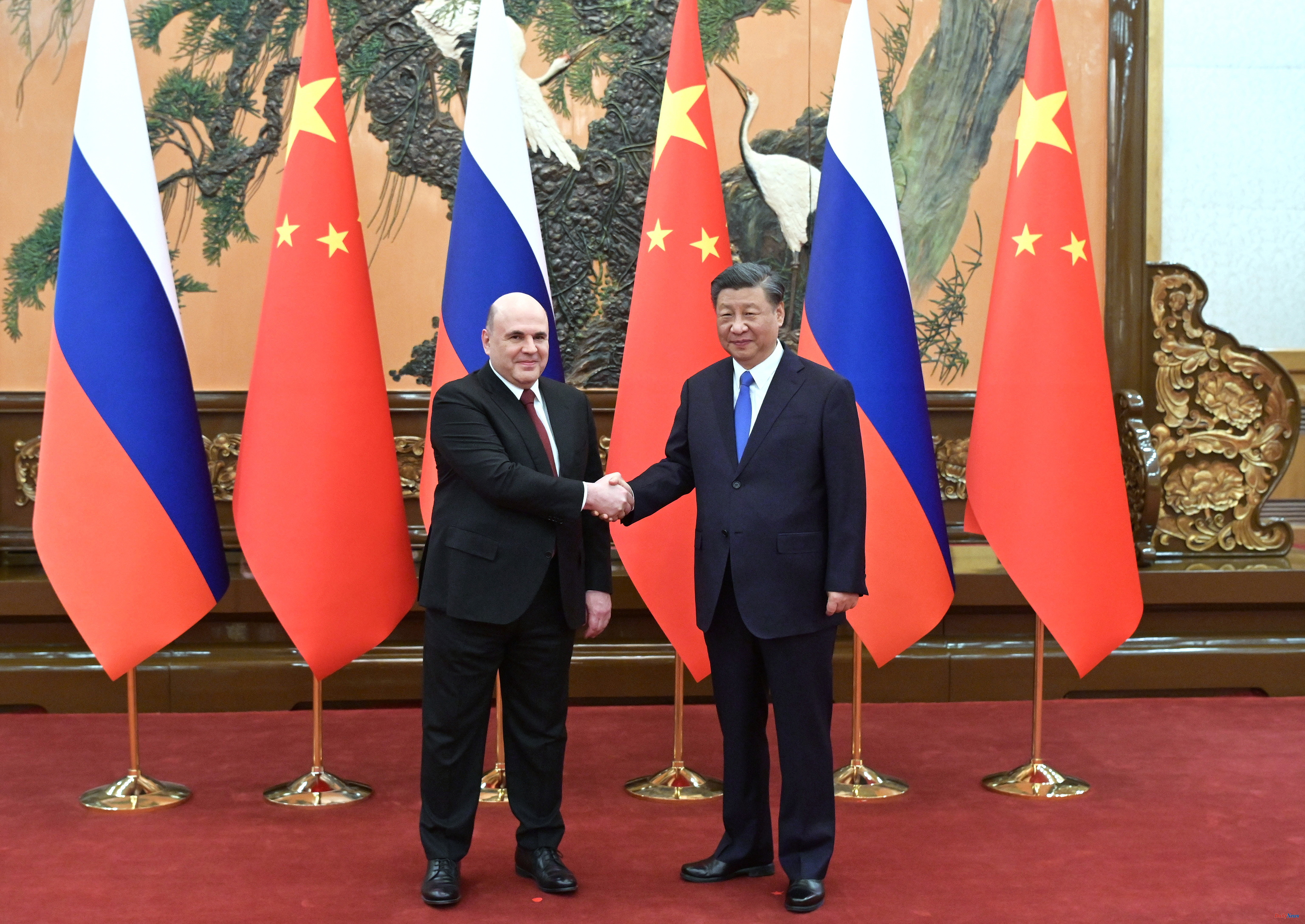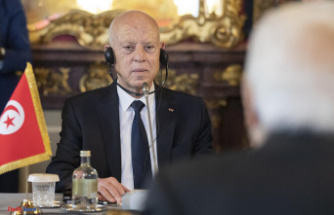The exacerbated geopolitical divisions after the Russian invasion in Ukraine are a fact, of which we find a good example these days when drawing a circle around everything that has moved through Japan and China. On the one hand, we have the Ukrainian president, Volodimir Zelensky, traveling to Hiroshima, where the G7 summit was taking place, to extract more military and financial guarantees from the leaders of the allied democracies. Then we have Russian Prime Minister Mikhail Mishustin traveling first to Shanghai to seek financial support for his country, and then to Beijing to strengthen political ties with Xi Jinping.
Inside the Great Hall of the People, the chamber of Tiananmen Square, Xi and Mishustin met again this Wednesday just two months after an earlier meeting they had in Moscow, where the Chinese leader also met his counterpart Vladimir. Putin. "Our countries together resist the attempts of the collective West to maintain world dominance and to use illegal sanctions to impose their will on independent states," Mishustin said, according to the first reading of the talk reported by his country's media.
The Russian prime minister, who has become the highest-ranking Kremlin official to set foot in Beijing since his boss Putin launched the invasion of Ukraine, added in his statement that Xi and Putin will meet again later this year to "synchronize their watches".
Before the meeting with Xi, the Russian signed with his Chinese counterpart, Li Qiang, a series of economic agreements that included deepening investment cooperation in commercial services and another to increase the export of agricultural products to China. "Today, Russia-China relations are at an unprecedented high level. They are characterized by mutual respect for each other's interests and a desire to jointly respond to challenges," Mishustin said. "China is willing to work with Russia to implement joint cooperation between the two countries," Li replied.
China has just seen near its gates, in neighboring Japan, how the leaders of the G7, in addition to discussing new sanctions against Russia, lined up to charge against its policies and accuse Xi of using his strong commercial position to intimidate others. countries.
A unit that in some sectors of the Chinese regime understand as a new movement by Washington to make friends with partners who in the future can help promote a conflict in the region. This current is convinced that if Putin's troops fall in Ukraine, they will be next. Faced with this scenario, the second world power is preparing to further strengthen its relationship with Russia, which also needs Beijing's economic support now more than ever.
One day after the G7 ended, the two countries most singled out by the group's communiqué had a meeting scheduled in the Russian capital to discuss "security issues." Chen Wenqing, a Chinese Politburo bigwig, had his photo taken in Moscow with Nikolai Patrushev, head of Russia's Security Council. That was the appetizer for the Russian prime minister's trip to China, where he made a first stop in Shanghai to participate in an economic forum.
Mishustin did not land alone in the financial capital of its Asian neighbor: he was accompanied by a group of Russian magnates from key sectors such as energy, fertilizers and mining, many of whom are saddled with sanctions imposed by Western allies.
Trade relations between the two countries continue to strengthen so far this year. According to the General Administration of Customs of China, trade in the first four months of this year reached 73.15 billion dollars, a year-on-year increase of 41.3%. Beijing, taking advantage of discounted Russian crude, became Russia's biggest energy customer last year. Power shipments from Putin's country are forecast to rise 40% this year.
After the closing of the G7 summit, Beijing and Moscow quickly came out to criticize the meeting of the leaders of the most industrialized democracies. From the Chinese Ministry of Foreign Affairs they accused the G7 of "obstructing international peace", while Russian Foreign Minister Sergei Lavrov added that the allies intended to eliminate Russia, not only on the battlefield, but also "as a competitor geopolitical".
In Hiroshima, the group pledged to continue providing military and financial support to Kiev "for as long as it takes," and to take further steps to curb Russia's ability to "fuel its war." President Xi Jinping was asked to put pressure on Putin, taking advantage of the close relationship the two leaders share, to end the invasion.
The meeting in Japan, and the subsequent visit of the Russian prime minister to China, coincided with the trip to Europe of the "peace envoy" that Xi Jinping chose to try to mediate in the war in Ukraine. Li Hui, a 70-year-old veteran diplomat, former ambassador to Moscow, was in Kiev to meet with President Volodymyr Zelensky and Ukrainian Foreign Minister Dimitro Kuleba, who made it clear to him that they will not accept any peace plan that goes through the loss of territory. The Kremlin has rejected those terms and it is unclear whether Xi, who has an interest in maintaining strong ties with Moscow, will be willing to pressure Putin to concede to Kiev's demands.
After the visit to the Ukrainian capital, Envoy Li, who is in charge of the Eurasian Affairs department, which manages diplomatic relations in a wide area including Russia, Eastern Europe and Central Asia, traveled to Poland, where He presented the ambiguous "peace plan" proposed by Beijing, which defends Ukraine's sovereignty and opposes the use of nuclear weapons, but also supports Putin's "security concerns."
The Russian prime minister's tour of the Asian giant also coincided with the appointment of a new Chinese ambassador in Washington, Xie Feng, who until now was the vice minister of Foreign Affairs in charge of supervising policy towards the US.
Xie, who comes from the hard wing of the Chinese Foreign Ministry and has had several rows with his US counterparts in recent years, said as soon as he landed in his new destination that his priority was to improve cooperation between the two countries. A comment that follows the more conciliatory line that Joe Biden marked during the G7 summit, when he assured that the ties between the two world powers could "begin to thaw very soon."
According to the criteria of The Trust Project












